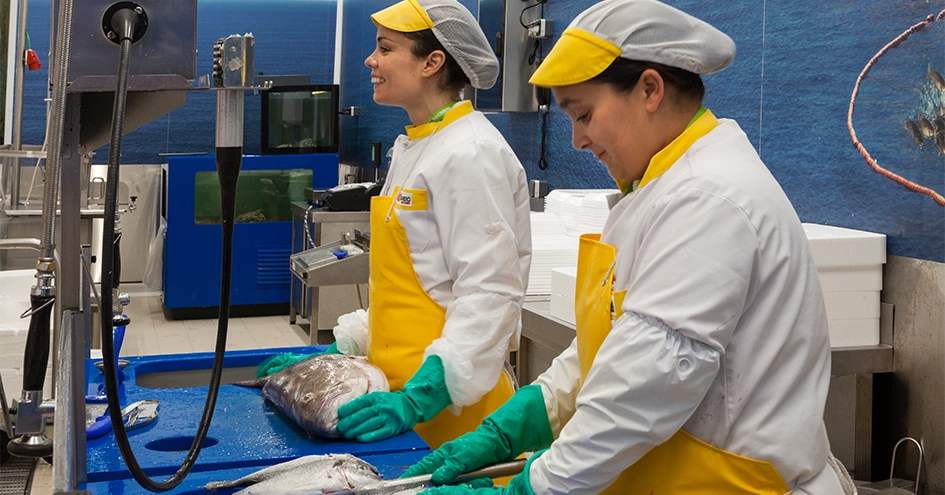The pay strategy of the different Companies follows three principles that we believe are key to meeting our responsibility as a benchmark employer in the countries where we do business:
- Creating a positive impact on our people, ensuring a balanced and dignified standard of living for employees and their families.
- Making sure that pay packages are competitive and adjusted to different functional levels and contents, ensuring that our policies and processes are in keeping with principles of fairness and equity.
- Recognising the effort and commitment of our teams, the achievement of results and the exceeding of targets, singling out and reinforcing exemplary performance and behaviour.

Take-home income
We guarantee an adequate base salary that affords a decent standard of living and is adjusted to the socio-economic context in each country in which we do business. We endeavour to follow criteria of fairness, internal equity and meritocracy when determining and reviewing the fixed remuneration of each of our employees, taking into account, among other factors, the content and responsibility of their role and the different levels of seniority. We set competitive entry-level salaries compared to national minimum wages and ensure pay increases in line with experience and performance levels.
The rise trend in the national minimum wage is common to the three countries where we have our main operations. In Poland, the national minimum wage is reviewed every two years (in January and July). In 2024, the Polish minimum wage increased over 19% compared to 2023, strengthening the significant growth trend of the past five years (over 65% since 2020). To remain competitive, Biedronka increased entry-level pay by 19%. In Portugal, all our Companies ensured an increase of up to 8% in their minimum entry-level salaries, in line with the increase of the national minimum wage.
The Companies’ efforts have enabled the take-home income of our employees to remain above the national minimum wage of each country in which we do business. We therefore continued to ensure that all Jerónimo Martins Group employees received adequate salaries, in accordance with the applicable benchmarks1.
Portugal
Take-home income between 17% and 60% above the national minimum wage.
Poland
Take-home income between 9% and 17% above the national minimum wage.
Colombia
Take-home income 12% above the national minimum wage.
We endeavour to ensure fair compensation, considering the demands, functional level and responsibility, seniority and the performance of each employee. Most of our employees see their salary reviewed after the first year of employment, as a means of rewarding their commitment and promoting differentiation based on experience and autonomy. We also have merit-based salary review processes in all the Companies.
In 2024, comparing the average salaries of the Group’s different Companies with the respective national minimum wages, there was a differentiation of at least 23%, which could be double that reference, as is the case in Ara (Colombia).
Recognition
All our Companies established mechanisms for recognising the effort and commitment of our teams, to single out exemplary performance and behaviours. We invested approximately 354 million euros in employee recognition measures (bonuses, awards and other mechanisms) in 2024, 13% more than in 2023. We highlight the following measures, applicable to all employees regardless of their workload:
- 143.2 million euros in awards resulting primarily from the performance of the Companies and the Group, and extraordinary award paid to several employees (around 91,000 employees);
- 175.9 million euros in awards and bonuses related to sales performance, non-absence and others;
- 7.9 million euros in seniority bonuses, as a way of recognising the loyalty and commitment of employees.

The local commitment to recognising employees was reinforced in 2024, with the following measures standing out:
- Pingo Doce reinforced its offer of incentives to operational teams;
- Recheio offered at least one monthly performance bonus, including the monthly store bonus, sales incentives, productivity bonus and the bonus related to Amanhecer store openings;
- Ara introduced incentives based on team performance in all its stores and distribution centres, substantially boosting the total income of Colombian employees;
- the Companies in Poland maintained their recognition strategy as a way of boosting business results and, consequently, employee’s available income.
Taking into account the hard work of all operational teams, who strived to increase sales volumes on a comparable basis (like-for-like), while limiting the impact of deflation on sales and profitability throughout the year, the Board of Directors decided to grant an exceptional reward during the Christmas season to non-management employees in Poland and Portugal, totalling 26.7 million euros, distributed as 18.1 million in Poland and 8.6 million euros in Portugal, benefiting over 100,000 employees.
Benefits
Supplementary benefits are a key component of a more robust value proposition that meets the needs of employees. Depending on their level of responsibility, employees have a benefits package that can include life insurance, health insurance, travel accident insurance, and a pension plan. These benefits are complemented by a package of work tools designed to make it easier for employees to carry out their duties, in addition to the wide range of family support and employee wellbeing measures.
We pay close attention to the needs, expectations, and preferences of our employees in the various countries, so we offer flexible benefit plans. This is the case with Bolsa Flex, a mechanism through which 5,265 employees of Pingo Doce, Recheio, JMA, and the Holding were able to decide, among the various existing options, how to use the available amount. Similarly, Hebe employees can allocate part of the sum from the Social Fund (a legally required mechanism in Poland) to 2,647 available options, giving them complete flexibility over how to use their money.
1 Comparing the lowest monthly income of the lowest remuneration category, equivalent to full-time working hours, excluding trainees and apprentices, with the applicable national minimum wage pursuant to the laws in each country and/or by collective bargaining, where applicable. Take-home income is calculated based on the lowest salary, plus any established additional payments that are guaranteed to all employed workers. In Portugal, this includes the entry base salary and meal allowance. In Poland it includes the entry base salary and presence allowance, and in Colombia it includes the entry base salary, meal allowance and transport allowance. We consider that Slovakia and Czechia, which account for 0.2% of our total workforce, are not yet sufficiently representative to calculate this indicator.
